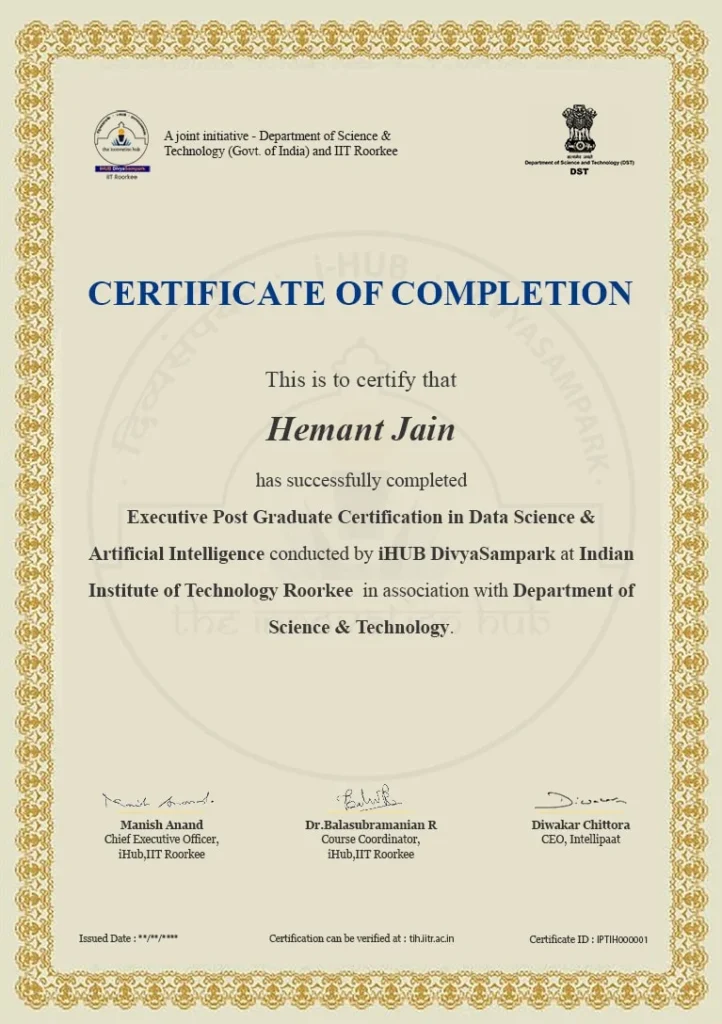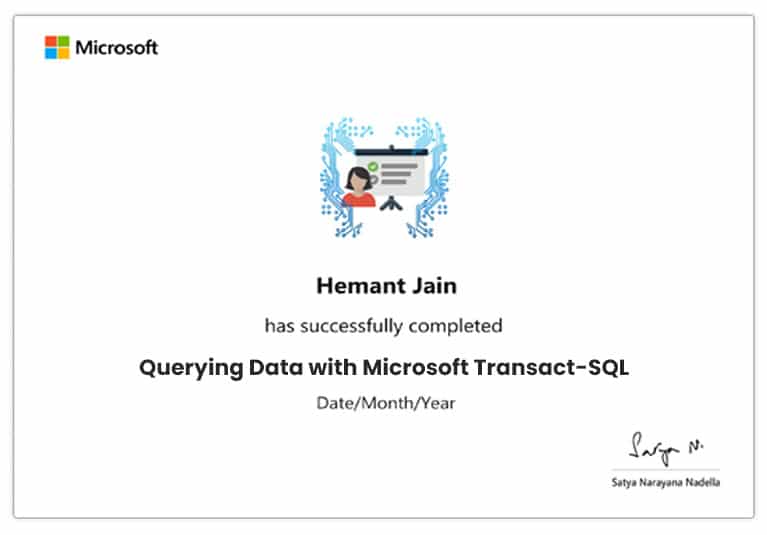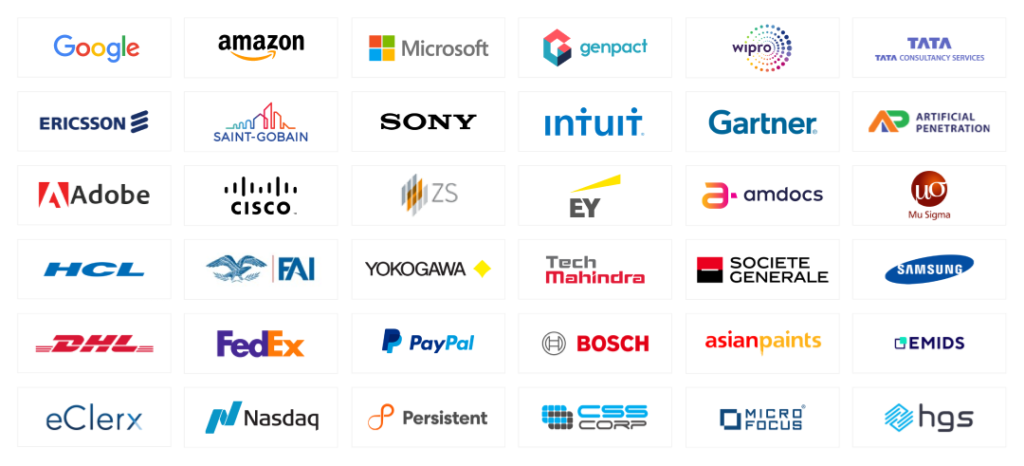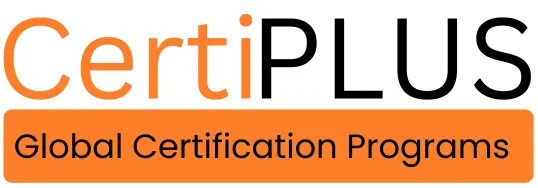Powered by CertiPLUS
The Certification is designed to equip candidates with the essential skills needed for professional-level project management roles.
As a credential aimed at preparing individuals for advanced project management positions, this certification offers the knowledge required to excel in the field.
It is also a valuable resource for those seeking entry-level project management positions, such as junior project manager or associate project manager.
Project management is a rapidly growing and in-demand field, and this certification can serve as a solid foundation for those looking to start or advance their careers in project management.
- Your first stepping stone to a career in the field
Exam Pattern
Multiple Choice Questions
Mode of Exam
Online from Home or Office
Duration of Exam
3 Hours
Open Book/Closed Book
Closed Book Exam
Certification Validity
3 Years
About Program
All About Certified Information Security Manager (CISM), Powered by ISACA
The Certified Information Security Manager (CISM) certification is a globally recognized credential offered by ISACA. It validates a professional’s expertise in managing and governing information security programs. CISM focuses on the skills and knowledge required to effectively manage the security of information systems, aligning security strategies with business goals. Here’s everything you need to know about CISM:
1. Overview of CPMP+
The CISM certification is considered one of the most prestigious credentials for professionals in information security management. It demonstrates your ability to manage and govern information security programs, ensuring that systems are protected, secure, and aligned with organizational goals. CISM is highly regarded across industries, from finance and healthcare to government and IT, as it highlights expertise in areas such as risk management, governance, incident response, and the protection of sensitive information.
2.CISM Certification Requirements
To be eligible for the CISM exam, candidates must meet specific educational and professional experience requirements:
Educational Requirements:
With a Four-Year Degree (Bachelor’s or Equivalent):
- 5 years of information security management experience.
- Experience must be in at least three of the four CISM domains.
With a High School Diploma or Associate’s Degree:
- 7 years of information security management experience.
- Experience must be in at least three of the four CISM domains.
Professional Experience:
The experience must include responsibilities such as the management of information security programs, risk assessments, governance, incident management, and the protection of information assets. It’s essential that the work involves real-world security management, not theoretical scenarios.
CISM Education and Training:
CISM candidates are required to have prior experience in security management across the following domains:
- Information Security Governance
- Information Risk Management
- Information Security Program Development and Management
- Information Security Incident Management
Some work experience can be substituted with academic qualifications or other professional certifications.
3. CISM Exam Overview
The CISM exam is a comprehensive test that evaluates a candidate’s knowledge and understanding of information security management principles and practices. As of the latest update, the exam consists of:
- 150 questions (multiple-choice, multiple responses, matching, and scenario-based questions)
- Time limit: 240 minutes
- The exam is based on the CISM Exam Content Outline, which outlines the standards, guidelines, and best practices for information security management, covering topics such as risk management, governance, incident response, and securing information assets.
4. Key Areas Tested in the CISM Exam
The exam is based on the CISM Exam Content Outline and covers the following four domains:
Information Security Governance
Establishing and maintaining the information security governance framework and supporting processes to ensure that information security aligns with business goals.Information Risk Management
Identifying and managing information security risks to achieve business objectives, including performing risk assessments, mitigating risks, and ensuring security controls are effective.Information Security Program Development and Management
Developing and managing the information security program, ensuring its alignment with organizational needs, and implementing strategies for continuous improvement.Information Security Incident Management
Planning, managing, and responding to information security incidents, including the detection, response, and recovery processes, and ensuring business continuity and compliance with relevant standards.
5. CISM Exam Content Outline
The CISM Exam Content Outline is the primary reference for the CISM exam and includes best practices, tools, techniques, and processes necessary for managing information security. It covers key areas like:
Information Security Governance
Establishing and maintaining the information security governance framework, ensuring alignment with business goals and supporting processes.Information Risk Management
Identifying, assessing, and managing information security risks to ensure business objectives are met and security controls are in place.Information Security Program Development and Management
Designing and managing information security programs, aligning them with organizational needs, and ensuring their continuous improvement.Information Security Incident Management
Developing, implementing, and managing processes to detect, respond to, and recover from information security incidents, ensuring business continuity and compliance.
6. CISM Exam Process
Step 1: Meet Eligibility Requirements
Ensure you meet the education and experience requirements for the CISM exam, including relevant work experience in information security management.Step 2: Apply for the CISM Exam
Complete the application through the ISACA website, detailing your work experience and education. ISACA will review and approve your application or request additional information.Step 3: Pay the Exam Fee
Once your application is approved, pay the exam fee. The fee is:- ISACA Members: $575
- Non-members: $760
Step 4: Schedule the Exam
After payment, you can schedule your exam with ISACA’s official testing partner, Pearson VUE. The exam can be taken at a testing center or online (proctored).Step 5: Prepare for the Exam
Use study materials such as the CISM Review Manual, practice tests, and CISM prep courses to prepare for the exam.Step 6: Take the Exam
The CISM exam is computer-based, and you’ll have 240 minutes to complete it. You’ll receive your results immediately after the exam.
7. CISM Exam Costs
- ISACA Member Fee: $575
- Non-Member Fee: $760
- Re-examination Fee: $575 for ISACA members, $760 for non-members
ISACA members receive a discount on exam fees, and membership costs around $145 per year. Membership can be beneficial if you plan to take the exam and access ISACA resources, including study materials, webinars, and networking opportunities.
8. Continuing Certification Requirements (CCR)
To maintain your CISM certification, you need to earn 120 Continuing Professional Education (CPE) hours every three years. CPE hours can be earned by participating in professional development activities, including:
- Attending ISACA events or conferences.
- Taking additional information security courses or training.
- Giving presentations or teaching in the information security field.
- Publishing articles or papers related to information security.
- Engaging in information security-related research or project work.
9. Benefits of CISM Certification
Career Advancement: CISM is highly valued by employers and can lead to higher-paying job opportunities, promotions, and career growth in the field of information security management.
Increased Credibility: CISM demonstrates your expertise, commitment, and leadership in information security, enhancing your professional reputation.
Global Recognition: CISM is recognized and respected worldwide, providing you with the flexibility to work in various industries and regions.
Networking Opportunities: CISM gives you access to the global ISACA community, facilitating collaboration, professional growth, and knowledge exchange in the field of information security.
10. CISM vs Other Certifications
CISSP (Certified Information Systems Security Professional): Aimed at experienced professionals, CISSP focuses on a broad range of cybersecurity topics, whereas CISM is more specialized in information security management.
CompTIA Security+: Ideal for entry-level professionals, CompTIA Security+ provides foundational knowledge in cybersecurity, while CISM is more focused on managerial and governance aspects of information security.
Certified Ethical Hacker (CEH): CEH is suited for professionals focused on offensive security and ethical hacking, whereas CISM focuses on the management and governance of security programs.
ISO/IEC 27001 Lead Implementer: This certification focuses on implementing information security management systems (ISMS), whereas CISM provides a more comprehensive look at managing information security at an organizational level.
CRISC (Certified in Risk and Information Systems Control): CRISC is focused on risk management and control, complementing CISM, which provides broader governance and incident management expertise in information security.
Conclusion
The CISM certification is a premier credential that demonstrates your competence in managing, designing, and overseeing the security of an organization’s information systems. It is ideal for those who are looking to build or advance their careers in information security management. With its focus on governance, risk management, and incident response, CISM prepares professionals to take on leadership roles in information security. The certification is highly regarded across industries, offering not just career growth but also increased credibility and opportunities to work in a variety of sectors globally. Investing in CISM is investing in your future as a leader in information security.
Key Highlights
- 620 Hrs of Applied Learning
- 218 Hrs of Self-Paced Learning
- 50+ Industry Projects & Case Studies
- 24*7 Support
- 1:1 Mock Interview
- iHUB DivyaSampark, IIT Roorkee Certification
- 2 Days Campus Immersion at IIT Roorkee
- Top 2 performers per batch will receive Rs 80000 in fellowship*
- Free Voucher for Exam AZ-900: Microsoft Azure Fundamentals worth $99
- 90+ Live Sessions Across 11 months
- Learn from IIT Faculty & Industry Practitioners
- One-on-One with Industry Mentors
- Dedicated Learning Management Team
- No-Cost EMI Option
- Designed for Working Professionals and Freshers
- Up to Rs. 50 Lakhs startup Incubation Support*
- 3 Guaranteed Job Interviews upon movement to Placement Pool

About iHUB DivyaSampark, IIT Roorkee
iHUB DivyaSampark aims to enable innovative ecosystem in new age technologies like AI, ML, Drones, Robots, data analytics (often called CPS technologies) and becoming the source for the next generation of digital technologies, products and services by promoting, enhancing core competencies, capacity building, manpower training to provide solutions for national strategic sectors and becoming a key contributor to Digital India. iHUB DivyaSampark a section 8 company (Non-Government Organization) is a Technology Innovation Hub, at IIT Roorkee and is set up under National mission on Interdisciplinary Cyber Physical systems (NM-ICPS), initiated by Department of Science & Technology (DST) to build innovative solutions, to train manpower and encourage entrepreneurship for the world’s current challenges like affordable health care, Industry 4.0 and sustainable smart cities.
Key Achievements of IIT Roorkee:
- Ranked 7th ‘Overall’ and 6th in ‘Engineering’ in India as declared by NIRF 2022
- Ranked 175th in the world for ‘Engineering and Technology’ by QS World University Rankings 2023
- Ranked as the 369th best institute in the world by QS World University Rankings 2023
- Ranked as the 114th best institute in Asia by QS World University Rankings 2023

About iHUB DivyaSampark, IIT Roorkee
Benefits for students from Microsoft:
- Free Voucher for Exam AZ-900: Microsoft Azure Fundamentals worth $99
- Industry-recognized certification from Microsoft
- Real-time projects and exercises

Career Transition



- 55% Average Salary Hike
- 55% Average Salary Hike
- 12000+ Career Transitions
- 400+ Hiring Partners
Who Can Apply for the Course?
- Individuals with a bachelor’s degree and a strong interest in learning AI and data science
- IT professionals looking to make a career transition as data scientists and artificial intelligence engineers
- Software Developer, Project managers, Non-Technical Professionals & Entry-level professionals looking to build their careers in artificial intelligence and data science
- Undergraduate freshers with an interest in Data Science & AI

What roles can a person trained in data science and artificial intelligence play?
Senior Data Scientist
Understanding problems and building models based on the data collected and leading a team of data scientists.
AI Expert
Developing strategies for frameworks and technologies to develop AI solutions and drive business success.
Machine Learning Expert
Using various machine learning tools and technologies, building statistical models with large amounts of business data.
Senior Data Scientist
Understanding problems and building models based on the data collected and leading a team of data scientists.
AI Expert
Developing strategies for frameworks and technologies to develop AI solutions and drive business success.
Machine Learning Expert
Using various machine learning tools and technologies, building statistical models with large amounts of business data.
Target Audience
The CISM certification is for managers, team members, students, and entry-level professionals in information security or risk management, as well as those looking to advance in security governance.
The CISM certification is suitable for you if you:
- Have a basic or limited understanding of information security management
- Work in or aim to work in information security, risk management, or governance
- Need knowledge to pass the CISM Certification Exam
- Want an internationally recognized credential in information security management
Curriculum
The Certified Information Security Manager (CISM) certification is based on a comprehensive body of knowledge and best practices outlined in the CISM Review Manual, published by ISACA. The CISM curriculum is structured around the four domains of information security management: Information Security Governance, Information Risk Management, Information Security Program Development and Management, and Information Security Incident Management.
Here's an overview of the key elements of the CPMP+ curriculum:
- Live Course
- Self Paced
- Industry Expert
- Academic Faculty
The CISM framework emphasizes the key process groups critical to managing information security programs effectively. These process groups ensure a structured approach throughout the information security lifecycle:
Initiating
Lays the foundation for information security initiatives by defining objectives, identifying stakeholders, and setting preliminary requirements.- Develop Security Charter, Identify Stakeholders, Define Initial Requirements.
Planning
Focuses on developing strategies, allocating resources, and defining goals for implementing security measures.- Develop Security Program Plan, Perform Risk Assessments, Define Scope, Allocate Resources, Plan Stakeholder Engagement, Create Communication Strategy.
Executing
Centers on implementing security controls, conducting assessments, and operationalizing security strategies.- Implement Controls, Conduct Security Assessments, Manage Security Resources, Execute Risk Mitigation Plans, Communicate Security Actions.
Monitoring and Controlling
Tracks performance and ensures alignment with security objectives, making adjustments as needed to address issues.- Monitor Security Metrics, Control Scope, Manage Incidents, Review Security Posture, Ensure Compliance with Standards.
Closing
Finalizes the security program activities, documents outcomes, and communicates results to stakeholders.- Close Security Initiatives, Document Results, Communicate Final Reports, Conduct Post-Implementation Reviews.
The 10 Knowledge Areas of CISM encompass essential aspects of information security management and provide a structured approach to developing, implementing, and maintaining effective security programs. Each knowledge area represents a critical discipline necessary to achieve organizational security objectives.
Integration Management
Ensures that all components of the information security program are properly aligned and coordinated.- Develop Security Charter, Create Security Management Plan, Direct and Manage Security Initiatives, Monitor and Control Security Activities, Implement Change Management, Close Security Projects or Phases.
Scope Management
Defines and manages what is included and excluded in the information security program.- Define Security Scope, Collect Security Requirements, Develop Policies and Procedures, Establish Security Boundaries, Validate Security Scope, Control Scope.
Time Management
Involves planning and managing timelines for implementing security controls and initiatives.- Plan Security Schedule, Identify Security Activities, Sequence Tasks, Estimate Timeframes, Develop Security Timelines, Monitor Schedule.
Cost Management
Ensures that security programs and initiatives are completed within the approved budget.- Plan Security Budget, Estimate Costs, Allocate Resources, Monitor and Control Expenses.
Quality Management
Ensures that security measures meet defined quality standards and objectives.- Establish Security Standards, Monitor Performance Metrics, Conduct Security Assessments.
Resource Management
Involves planning, organizing, and managing both human and technical resources for security activities.- Plan Resource Allocation, Identify Resource Needs, Acquire Security Resources, Develop Security Teams, Manage Resources Effectively.
Communications Management
Ensures clear and effective communication throughout the information security lifecycle.- Develop Communication Plan, Share Security Updates, Monitor Communication Effectiveness.
Risk Management
Focuses on identifying, analyzing, and mitigating risks to protect organizational assets.- Develop Risk Assessment Methods, Identify Threats and Vulnerabilities, Evaluate Risks, Develop Risk Response Plans, Monitor Risk Mitigation.
Procurement Management
Manages the acquisition of security tools, technologies, and services to support the program.- Plan Procurement Strategies, Evaluate Vendors, Conduct Procurements, Monitor Vendor Deliverables.
Stakeholder Management
Involves identifying and managing the expectations and involvement of stakeholders in the security program.- Identify Stakeholders, Develop Engagement Plans, Collaborate with Stakeholders, Monitor Engagement Outcomes.
The CISM exam focuses on three critical domains of information security management. These domains represent essential competencies aligned with modern practices, emphasizing governance, risk management, and strategic alignment.
People (42%)
Emphasizes leadership, communication, team dynamics, conflict resolution, and stakeholder engagement in managing information security programs. This domain focuses on:- Building and leading effective security teams.
- Managing communication during incidents or program implementation.
- Engaging stakeholders to align security objectives with organizational goals.
Process (50%)
Concentrates on the technical and operational aspects of managing information security, focusing on processes required to safeguard organizational assets. This domain includes:- Developing and enforcing security policies and procedures.
- Conducting risk assessments and implementing controls.
- Monitoring, detecting, and responding to security incidents effectively.
Business Environment (8%)
Focuses on aligning the information security program with the organization’s strategy to deliver measurable business value. This domain emphasizes:- Understanding organizational goals and strategic priorities.
- Ensuring compliance with regulatory and legal requirements.
- Demonstrating how the security program contributes to business resilience and success.
In addition to the core domains and knowledge areas, the CISM curriculum integrates various methodologies and approaches for managing information security programs. Some of the key concepts include:
Traditional Security Management Approaches
A structured, sequential approach to information security management, often used in stable environments where processes are well-defined. This approach emphasizes:- Clear roles and responsibilities.
- Fixed security controls and procedures.
- A step-by-step methodology for implementing security programs.
Agile Security Management
Focuses on iterative, flexible approaches to managing security in rapidly changing environments. It emphasizes:- Quick adaptation to emerging threats.
- Continuous improvement in security practices.
- Collaboration and quick response to security incidents.
Hybrid Security Approaches
Combines elements of both traditional and agile methods to adapt to varying security needs and project requirements. This approach may include:- A combination of rigid security frameworks with adaptive risk management practices.
- Flexibility in response to new security challenges while maintaining core security governance.
CISM Competency Framework
Emphasizes the balance between technical security management skills, leadership capabilities, and strategic business alignment. It focuses on:- Developing technical expertise in security governance, risk management, and incident response.
- Building leadership skills to guide security teams and engage stakeholders.
- Aligning security strategies with broader organizational goals to ensure business resilience.
To maintain your CISM certification, you must earn Continuing Professional Education (CPE) credits every 3 years by participating in ongoing education and professional development activities related to information security management. These activities may include:
- Attending training sessions, webinars, or conferences focused on information security.
- Engaging in relevant workshops or seminars that enhance your security management skills.
- Participating in other professional development opportunities to stay updated on the latest trends, threats, and technologies in the field of information security.
Program Highlights
- 55% Average Salary Hike
- 55% Average Salary Hike
- 12000+ Career Transitions
- 400+ Hiring Partners
Conclusion
The CISM curriculum is designed to ensure that professionals have a comprehensive understanding of key concepts, tools, and techniques necessary for managing information security and mitigating risks. It emphasizes both the technical and strategic aspects of security management, with a focus on aligning security practices with organizational goals. The certification provides a structured framework for professionals to demonstrate their expertise and competency in managing information security programs across various industries and organizations.
Dos and Don'ts
Preparing for the Certified Information Security Manager (CISM) certification, powered by CertiPLUS, requires strategic planning and a thorough understanding of the exam content, along with effective study and exam-taking techniques. Below are key dos and don’ts to guide your preparation and approach to the exam.
Do Thoroughly Review the CISM Review Manual
- Study the CISM Review Manual to understand the four domains: Information Risk Management, Information Security Governance, Information Security Program Development, and Incident Management.
- Focus on the key concepts, definitions, and practices related to these domains.
Do Use Additional Study Materials and Resources
- Supplement your studies with other resources like the “CISM Certified Information Security Manager All-in-One Exam Guide.”
- Take online courses, practice exams, and use forums to strengthen your understanding of complex topics.
Do Practice with Sample Questions and Mock Exams
- Regularly practice with CISM sample exams to familiarize yourself with the format and question types.
- Time yourself during these practice exams to improve your time management and ability to complete questions under pressure.
Do Understand the CISM Exam Content Outline
- Review the CISM Exam Content Outline published by ISACA to understand the domains and tasks required.
- Align your study focus to ensure you’re covering all critical areas, with emphasis on risk management and governance.
Do Follow a Structured Study Plan
- Create a study schedule and break down the material into smaller sections for easier digestion.
- Stick to your plan and pace yourself, allowing enough time for each domain to ensure thorough preparation.
Do Join Study Groups or Forums
- Engage with online study groups or forums such as LinkedIn or ISACA communities to share knowledge.
- Discussing topics with other candidates can offer new insights and help clarify difficult concepts.
Do Read Each Question Carefully During the Exam
- Pay close attention to keywords in each question, such as “most likely,” “best practice,” and “except.”
- These keywords can significantly alter the meaning of the question, so understanding them is crucial.
Do Manage Your Time During the Exam
- Practice pacing yourself during mock exams to ensure you complete the test in the allotted time.
- Allocate time to review your answers and make sure you haven’t missed anything.
Do Take Care of Your Health
- Maintain good physical and mental health during your preparation.
- Eat well, sleep enough, and exercise to keep your mind clear and focused on exam day.
Don’t Rely Solely on the CISM Review Manual
- While essential, the CISM Review Manual alone doesn’t cover all the exam topics in-depth.
- Supplement your studies with additional materials such as practice exams, guides, and other resources to ensure comprehensive coverage.
Don’t Memorize, Understand
- Avoid memorizing terms and definitions without understanding their application.
- Focus on understanding the core concepts and how they apply to real-world information security scenarios.
Don’t Overlook the ISACA Code of Professional Ethics
- The ISACA Code of Professional Ethics is included in the exam and covers key aspects of professional conduct.
- Make sure to understand these ethical principles and how they relate to your role as an information security manager.
Don’t Skip Technical Details
- Don’t ignore technical areas such as risk management, security controls, and governance frameworks.
- Understanding the technical aspects of security and their management is critical for passing the exam.
Don’t Spend Too Much Time on One Question
- If you’re stuck on a question, don’t linger on it for too long.
- Mark it for review and move on to ensure you have enough time to answer all questions.
Don’t Ignore Emerging Technologies and Trends
- Stay updated on the latest trends in information security, including cloud security, data privacy regulations, and threat intelligence.
- Emerging technologies are often part of the exam, so understanding how they impact security is essential.
Don’t Second-Guess Your Answers
- Once you’ve answered a question, don’t second-guess your choice.
- Trust your preparation and instincts—second-guessing can often lead to mistakes.
Don’t Leave Questions Unanswered
- There’s no penalty for guessing, so be sure to answer every question.
- If unsure, eliminate clearly incorrect options to improve your chances of selecting the correct one.
Don’t Get Overwhelmed
- The CISM exam can seem daunting, but stay calm and focused.
- Trust in your preparation, take deep breaths, and approach each question logically.
Don’t Forget to Take Breaks During the Exam
- Make sure to take advantage of any scheduled breaks to clear your mind and recharge.
- Use these moments to stay relaxed and maintain focus throughout the exam.
Additional Tips for CISM Exam Success:
- Familiarize Yourself with the Exam Interface: Take a practice test, if available, to get comfortable with the exam software and navigate the questions smoothly.
- Stay Informed on Exam Updates: ISACA occasionally updates the exam content and format, so check for any changes before your exam date.
- Approach the CISM Exam with Focus: It’s a demanding exam, but with thorough preparation and the right mindset, you can succeed. Stay disciplined in your studies and maintain a positive attitude.
Reviews
CISM Certification: Reviews on the Certified Information Security Manager (CISM) certification are overwhelmingly positive, particularly for those aiming to formalize their expertise in information security management and advance into leadership roles. The certification is often praised for its comprehensive coverage of security governance, risk management, and incident response, making it highly valued by employers.
Positive: Achieving the CISM certification has proven to be a career booster for many professionals, leading to higher-paying roles, promotions, and increased job stability. Recognized globally as a benchmark in information security management, it sets candidates apart in a competitive job market and opens doors across industries.
Negative: The certification may not always result in immediate career advancements or salary increases, particularly in organizations or roles where CISM is not a mandatory credential.
Positive: The CISM certification provides a deep dive into information security governance, risk management, incident response, and security program management, preparing candidates to tackle real-world challenges in the field.
Negative: Some candidates find the CISM material overwhelming, especially those with limited experience in security management or information systems. The dense theory and terminology can be challenging, particularly for those with more hands-on technical backgrounds.
Positive: The availability of structured study plans, books, online courses, and study groups makes preparing for the CISM exam manageable. These resources help candidates organize their study time and cover all exam topics effectively.
Negative: The CISM exam is considered difficult, with a high failure rate on the first attempt. Some candidates feel that while the exam covers important security standards, it may not assess practical, hands-on experience as effectively as some might like.
Positive: Successful candidates describe the CISM exam as a challenging but rewarding experience, pushing them to deepen their understanding of information security management. The exam thoroughly tests knowledge of security governance, risk management, and incident response.
Negative: Some find the CISM exam intimidating due to its format (questions covering multiple domains with limited time) and the depth of knowledge required. Certain questions may feel highly theoretical and disconnected from real-world security management practices.
Positive: The CISM certification is highly regarded worldwide and is often a requirement or strong preference for security management roles. It offers international mobility for professionals seeking opportunities across different countries and industries.
Negative: Some feel that CISM may be more useful in larger organizations or industries with formal security management structures. In smaller companies or more agile environments, the certification may be less recognized or relevant.
Positive: The CISM certification is seen as a valuable investment in a professional’s career, offering long-term benefits. Many candidates find the time and financial commitment worthwhile, especially given the career advancement it can provide in information security management.
Negative: The cost of the CISM exam and preparation materials can be significant, and the study time required may be challenging for those balancing busy work schedules or limited experience in security management.
Positive: The CISM certification is highly respected in the information security field and often leads to higher-paying roles, promotions, and increased job stability. It enhances a professional’s ability to manage and govern security programs effectively.
Negative: Some professionals may find that the CISM certification alone does not guarantee immediate career advancement. Its value can be limited in organizations where hands-on experience in security management is prioritized over certifications.
Overall Review Summary:
The CISM certification is one of the top credentials in information security management, recognized globally. It focuses on key areas like security governance, risk management, and incident management. CISM is ideal for professionals looking to advance to leadership roles in information security. While it enhances career prospects and salary potential, the exam can be tough, especially without significant experience in security management. Preparation can be time-consuming and costly. Despite these challenges, CISM is a powerful certification for professionals seeking to demonstrate their expertise and improve their career trajectory in cybersecurity.
Our Alumni Works At

Peer Learning
Via Certiplus, you can interact with your peers across all classes and batches and even our alumni. Collaborate on projects, share job referrals & interview experiences, compete with the best, make new friends – the possibilities are endless and our community has something for everyone!
